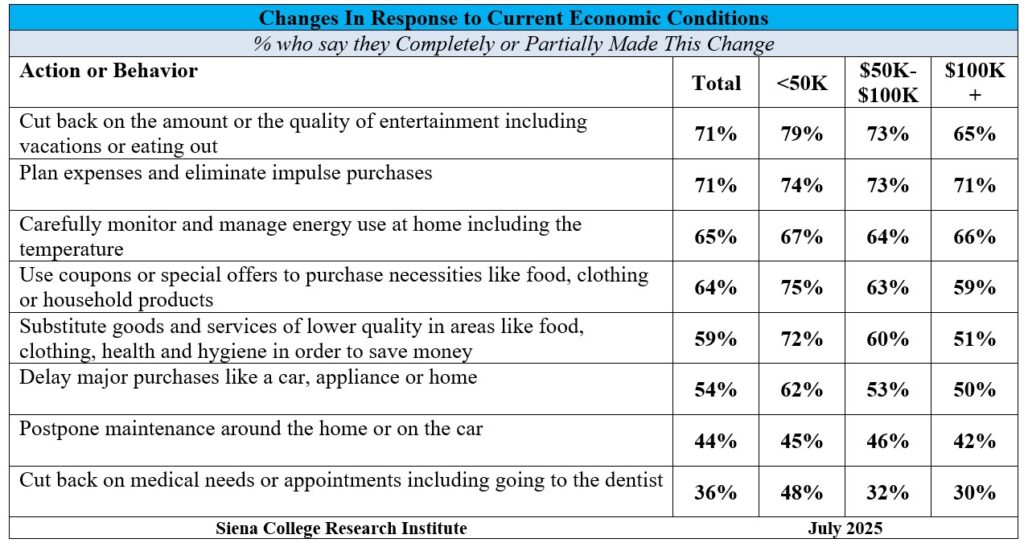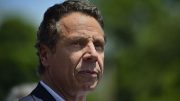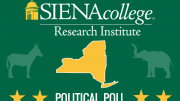- Only 52% Confident They will Receive Promised Social Security Benefits; Fewer, 48% Believe Medicare will Provide Required Quality Medical Care
- Plurality, 48%, Staying Even Financially, 20% Getting Ahead, 32% Falling Behind; 60% Not Confident in the Government’s or Trump’s Ability to Lead Country Out of Economic Difficulty
Press Release Crosstabs CloudResearch Blog
Loudonville, NY – A plurality of New Yorkers, 47%, feel that our country’s best economic days are behind us and that the next generation will face a lower standard of living, while 45% say our country’s current problems are temporary and we will return to financial health. Fifty-two percent of New Yorkers are confident they will receive the money from Social Security promised by the United States Government, while 45% are not confident they will receive the benefit, according to the latest poll by the Siena College Research Institute (SCRI).
New Yorkers’ confidence is split on Medicare providing high quality medical care. Forty-eight percent are confident they will be provided with the quality of care they require, while 46% are not confident. Asked whether they are getting ahead, staying about even, or falling behind when it comes to money, 20% of residents say they are getting ahead, but more, 32%, are falling behind, and about half, 48%, are staying even. Sixty percent of New York residents say they are not confident in the government’s ability to lead the nation out of current economic difficulty, and similarly, 60% say they are not confident in President Trump’s ability to lead the country out of any current economic difficulty.
“New Yorkers are narrowly pessimistic on the future of the nation’s economy, with slightly more saying that our best days are behind us rather than ahead,” according to Travis Brodbeck, SCRI’s Associate Director of Data Management. “Across the state more residents are telling us that they are falling behind than getting ahead, with almost half treading water. Majorities lack confidence in the government’s or the President’s ability to navigate current economic challenges. As concerning as these numbers are, the alarm bells are ringing louder for those earning less than $50,000 annually. Among New York’s lowest earners, 56% think our country’s best days are behind us, 53% are falling behind when it comes to money, and only 43% are optimistic about their personal future finances.”
In preparation for retirement, 53% of New Yorkers have researched social security benefits, 46% of state residents researched Medicare benefits, and 61% made contributions to a retirement savings account like a 401k. Of the 29% of New Yorkers who are retired, 6 in 10 retirees are confident they will have enough money to maintain their quality of life throughout retirement. Of those who are not retired, only 52% are confident that they will be able to retire and have enough money to maintain their quality of life.
Nearly equal shares of New Yorkers who are retired and not retired say they are falling behind when it comes to money, 30% and 33% respectively. Among retirees, confidence in maintaining their quality of life varies significantly by income: 89% of those earning $100,000 or more annually are confident, compared to just 41% of those earning less than $50,000. A similar relationship exists for those who are not currently retired, where 68% of those earning $100,000 or more are confident, while only 31% of those earning less than $50,000 are confident.
Although 20% of New Yorkers say they are getting ahead, differences exist across partisan lines, with 32% of Republicans saying they are getting ahead compared to 17% of Democrats and 14% of independents. Of those who say that when it comes to money they are getting ahead, 71% say the country’s economic challenges are temporary, but 63% of those who are falling behind say the country’s best economic days are behind us. Six in ten residents are not confident in the ability of the government or President Trump to lead the nation out of current economic difficulty. However, Republican confidence levels are significantly higher: twice as many Republicans as Democrats are confident in the government, and over three times as many Republicans are confident in President Trump. Despite being split on the nation’s economic future, 53% of New Yorkers are very or somewhat optimistic about their personal future finances. Two-thirds, 66%, of Republicans are optimistic about their financial future, but only 49% of Democrats are optimistic and 51% of independents are optimistic.
“Current opinions on the nation’s economy are influenced by political affiliation,” said Brodbeck. “Compared to Democrats, Republicans are more likely to say they are getting ahead, more optimistic on the future of their finances, and more confident that they will get Social Security benefits. Republicans are more confident that they will receive quality care from Medicare, and more confident that they will have enough money to maintain their quality of life during retirement, than are Democrats. And with Republicans in charge of Congress and the White House, Empire State Republicans have significantly more confidence in both the United States Government’s and President Trump’s ability to lead the nation out of current economic difficulty.”
In response to current economic challenges, at least 6 in 10 say that they are cutting back on entertainment, planning expenses, carefully monitoring home energy use, using coupons or special offers to buy household items, and substituting goods and services with lower quality items. Those earning the least were more likely to say that they completely or partially made a change in response to current economic conditions.

Qualitative Findings
In collaboration with CloudResearch, 114 of the individuals surveyed also participated in AI-assisted, in-depth interviews via the Engage survey platform, enabling qualitative follow-up at scale. This report primarily focuses on the quantitative findings from all 921 respondents. However, these open-ended reflections from the interviews provide valuable context and nuance, helping to illuminate the “why” behind the data and offering a deeper look into the thoughts, feelings, and lived experiences that shaped New Yorkers’ responses. A more in-depth report and full analysis of this qualitative data is available at CloudResearch’s blog post about this study.
To access CloudResearch’s report, please visit https://www.cloudresearch.com/resources/blog/a-new-era-in-new-york-state-polling/.
This Siena College Poll was conducted June 25 – July 2, 2025, among 921 New York State Residents. Of the 921 respondents, 516 were contacted through a dual frame (landline and cell phone) mode (237 completed via text to web) and 405 respondents were drawn from a proprietary online panel (Cint). Of the 237 respondents who completed the survey via text to web, 114 completed them on CloudResearch’s Engage software platform and 123 were collected on the Voxco survey software. Telephone calls were conducted in English and respondent sampling was initiated by asking for the youngest person in the household. Telephone sampling was conducted via a stratified dual frame probability sample of landline and cell phone telephone numbers weighted to reflect known population patterns. The landline telephone sample was obtained from ASDE and the cell phone sample was obtained from Marketing Systems Group (MSG). Interviews conducted online are excluded from the sample and final analysis if they fail any data quality attention check question. Duplicate responses are identified by their response ID and removed from the sample. Three questions were asked of online respondents, including a honey-pot question to catch bots and two questions that ask respondents to follow explicit directions. The proprietary panel also incorporates measures that safeguard against automated bot attacks, deduplication issues, fraudulent VPN usage, and suspicious IP addresses. Coding of open-ended responses was done by a single human coder. Data from collection modes was weighted to balance sample demographics to match estimates for New York State’s population using data from the Census Bureau’s 2023 U.S. American Community Survey (ACS), on age, region, race/ethnicity, and gender to ensure representativeness. The sample was also weighted to match current patterns of party registration using data from the New York State Board of Elections. It has an overall margin of error of +/- 3.6 percentage points including the design effects resulting from weighting. Sampling error is only one of many potential sources of error and there may be other unmeasured error in this or any other public opinion poll. The Siena College Research Institute, directed by Donald Levy, Ph.D., conducts political, economic, social, and cultural research primarily in NYS. SCRI, an independent, non-partisan research institute, subscribes to the American Association of Public Opinion Research Code of Professional Ethics and Practices. For survey cross-tabs: www.Siena.edu/SCRI/.




